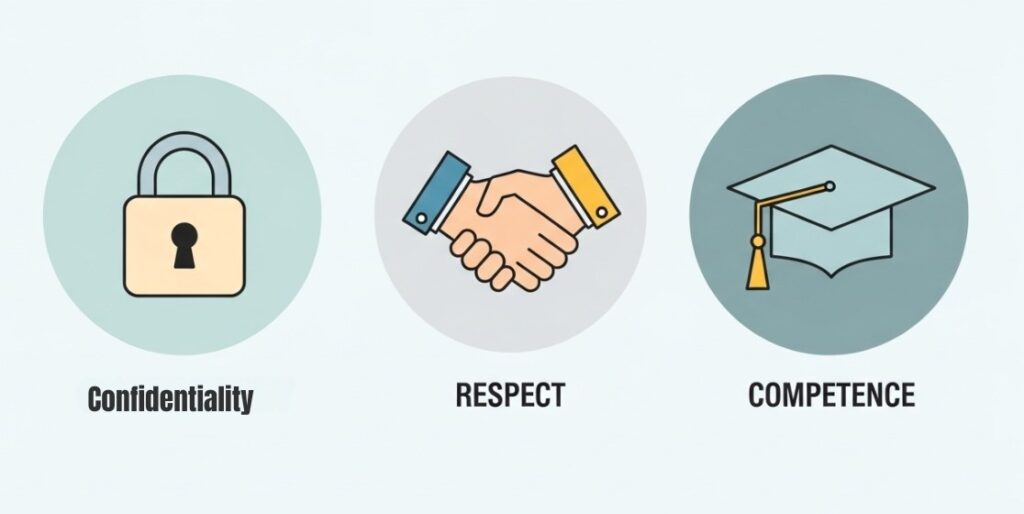As a life coach in Ontario, you’re guiding your clients toward their goals and navigating a space where trust and integrity are key. Every conversation you have and every piece of advice you give is built on a foundation of ethical responsibility.
As life coaches, professionals often face moments where they must make decisions beyond just helping someone with their next step. It’s about protecting clients’ privacy, setting clear boundaries, and ensuring that the guidance provided is always in their best interest.
When you operate with strong ethical standards, you do more than just follow rules; you create a space where you and your clients can thrive. These ethical considerations shape how you practice, ensuring your clients feel respected, heard, and safe.
In this article, we’ll break down the key ethical considerations every life coach in Ontario needs to consider, ensuring you approach each coaching session with clarity and professionalism.
Understanding Ethical Standards in Life Coaching

Life coaching is built on trust; maintaining ethical standards is key to ensuring trust is never broken. Ethical principles like confidentiality, respect, and competence guide your practice, helping you navigate the complexities of your client relationships with integrity.
These standards aren’t just about following rules; they shape how you interact with clients, handle sensitive information, and provide professional guidance. Ethical practices create a space where clients feel safe, heard, and valued.
What Are Ethical Standards in Life Coaching?

Ethical standards in life coaching ensure that your practice remains professional and effective. Key principles include:
- Confidentiality: Safeguarding clients’ personal information, ensuring they feel secure sharing sensitive details.
- Respect: Treating clients with dignity, recognizing their autonomy, and fostering an environment of trust.
- Competence: Offering services only within your expertise and knowing when to refer clients to other professionals if necessary.
These principles help you build trust with your clients, ensuring that their privacy and well-being are always prioritized.
Professional Guidelines for Life Coaches in Ontario
In Ontario, life coaches are expected to follow professional guidelines set by regulatory bodies like the International Coach Federation (ICF) or the Center for Credentialing & Education (CCE). These organizations provide a Code of Ethics and Professional Conduct that life coaches must adhere to.
Their guidelines cover everything from client relationships to professional conduct, ensuring that coaches uphold integrity.
These associations help coaches navigate ethical dilemmas and maintain high standards across the profession, ensuring a consistent and trustworthy experience for clients.
Core Ethical Issues Life Coaches Face in Ontario

As a life coach, you may encounter various ethical challenges during your practice. Let’s dive into the most common issues and how to handle them professionally and carefully.
Confidentiality and Privacy
Confidentiality is the bedrock of any coaching relationship. Clients must feel safe sharing personal thoughts and feelings, knowing their information is protected. This includes everything from session notes to personal conversations.
However, there are situations where confidentiality may need to be broken, such as if a client is at risk of harming themselves or others. Understanding when and how to disclose information is crucial to maintaining ethical standards.
Conflict of Interest and Dual Relationships
A conflict of interest arises when your interests interfere with your ability to act in your client’s best interest. For example, coaching family members or close friends can create dual relationships, where the lines between professional and personal become blurred.
To avoid this, it’s important to establish clear boundaries. If you choose to work with someone you have a personal relationship with, discussing potential conflicts openly and setting proper expectations for the coaching relationship is essential.
Informed Consent and Transparency
Informed consent ensures clients understand coaching, including the goals, methods, expectations, and fees. As a life coach, being transparent about your processes and potential outcomes is important. This openness helps clients decide whether coaching is right for them.
Before starting any coaching relationship, ensure that consent is given and revisit it if anything changes throughout the process.
Competence and Continuing Education
Life coaching is a living; staying up-to-date with new techniques, research, and ethical practices is key to maintaining your competence. Whether through certification programs, workshops, or self-study, continuing education ensures you’re always improving as a coach.
Not only does this make you better at what you do, but it also ensures that you can provide the best possible service to your clients while keeping ethical standards high.
Handling Ethical Breaches:
Sometimes, clients might cross boundaries or engage in behavior that violates agreed-upon ethical standards (e.g., discussing personal matters that could interfere with the coaching relationship).
In these situations, the coach must address the issue directly by discussing it with the client or referring them to other professionals if needed. Always document such breaches and handle them with respect and professionalism.
Legal Considerations for Life Coaches in Ontario

Running a life coaching practice isn’t just about helping clients improve their lives; it also involves understanding and complying with the legal landscape. Legal considerations ensure that both you and your clients are protected. Let’s explore the key legal aspects that every Ontario life coach should know, from contracts to liability insurance.
The Role of Legal Frameworks in Life Coaching
Life coaching is a profession that operates within certain legal boundaries. As a coach, you must understand the laws impacting practice. These include rules around business operations, client rights, and your services. Familiarizing yourself with these laws helps you avoid costly mistakes and ensures you’re delivering services in a way that’s ethical and compliant.
For instance, Ontario law outlines consumer protection rules, including how services must be clearly defined, what fees can be charged, and how contracts should be handled. These regulations aren’t just for large corporations; they apply to you, too, as an independent coach. Knowing these rules will not only protect your clients but also safeguard your business.
Contracts and Written Agreements
One of the easiest ways to avoid legal issues is by having clear written agreements with your clients. A contract is not just a piece of paper; it’s the foundation of your professional relationship. It sets expectations, clarifies your role, and provides protection if anything goes wrong.
Your coaching contract should cover the basics: the services you’re offering, the fees, how long the coaching relationship will last, and your policies for cancellations or refunds. It’s also a good idea to include confidentiality agreements, which protect both you and your clients.
By laying out all the details in writing, you ensure that both parties are on the same page and can avoid misunderstandings later.
Insurance and Liability Protection
Even with solid contracts, life coaches need protection if something goes wrong. That’s where liability insurance comes in. Having the right coverage ensures that you’re protected from legal action if a client feels they’ve been harmed or if something unexpected happens during your sessions.
There are different types of insurance to consider. General liability insurance covers things like personal injury, while errors & omissions insurance protects you if a client claims you made a mistake or failed to deliver what was promised. Both are important to have in place to cover the risks of offering professional services.
Without the right insurance, you could be left financially exposed. Insurance provides peace of mind, allowing you to focus on your clients and know that you’re covered if any issues arise.
Best Practices for Maintaining Ethical Integrity as a Life Coach

As a life coach, your success is built on trust, professionalism, and integrity. But maintaining these ethical standards day in and day out requires more than just knowing the rules; it’s about practicing them every time you work with a client. Here’s how you can maintain ethical integrity and ensure your practice stays aligned with both professional standards and your personal values.
Building Trust and Rapport with Clients
Trust is the foundation of every successful coaching relationship. It’s not just about what you say, but how you make clients feel. From the moment a client walks into your practice, they should feel that they are in a safe space where their thoughts and feelings will be respected.
Building that trust doesn’t happen overnight, but with each session, you reinforce it by being consistent, respectful, and genuinely invested in their well-being.
Start by actively listening to your clients. Show empathy, but also set boundaries where needed. Make sure they know that their personal stories will stay between you two unless, of course, there’s a legitimate reason to break confidentiality.
This openness helps create a supportive environment where your clients feel comfortable exploring their challenges.
Self-Reflection and Ethical Decision-Making
There will be moments when you face tough choices that test your ethical values. These could be situations where you’re unsure whether to refer a client to another professional, or perhaps when you need to reconsider your role in a client’s life.
The key to handling these situations is self-reflection. Regularly taking the time to reflect on your actions and decisions helps you stay true to your ethical standards.
Ask yourself questions like: “Did I put my client’s needs first?” or “Was I transparent in my process?” This regular reflection will help you grow as a coach, refine your approach, and avoid repeating mistakes. It also helps you become better equipped to make ethical decisions when things get tricky.
Supervision and Peer Support
Even the most experienced life coaches need support. Supervision or mentorship is an important part of maintaining ethical integrity. Having someone to turn to when you’re facing ethical dilemmas or tricky situations can make all the difference. Peer support can offer fresh perspectives and remind you of the ethical guidelines you need to follow, even when the lines between personal and professional feel blurry.
Think of supervision as a safety net; it’s there to catch you when you might fall into an ethical gray area. Regularly discussing your cases with a mentor or fellow life coach can help you stay grounded, reinforce ethical boundaries, and ensure that you’re always acting in your clients’ best interests.
Conclusion
In Ontario, life coaching is a rewarding profession built on trust, integrity, and ethical responsibility. By adhering to ethical considerations for Ontario life coaches, you not only safeguard your clients’ well-being but also ensure your practice is sustainable and professional.
Whether it’s maintaining confidentiality, setting clear boundaries, or committing to ongoing education, these ethical standards will guide you in making sound decisions and fostering strong, respectful relationships with your clients.
Remember, ethical practices are more than just rules; they are the foundation of your reputation and the key to long-term success. By staying true to these principles, you’ll create an environment where both you and your clients can thrive. So, continue to uphold these ethical standards, invest in your growth, and let integrity guide your coaching journey.
Frequently Asked Questions: Ethical, Practical & Professional Life Coaching in Ontario
Q: What are the key ethical standards life coaches in Ontario must follow?
Life coaches in Ontario must uphold client confidentiality, set clear boundaries, obtain informed consent, avoid conflicts of interest, and prioritize client wellbeing. These ethical standards build trust and professionalism in coaching relationships.
Q: How do I become a certified life coach in Ontario?
Though Ontario doesn’t legally require coaching certification, pursuing credentials like ICF or EMCC enhances credibility. Look for programs offering training, mentoring, and coaching hours to build competence and trust.
Q: What are the risks of working with unregulated life coaches in Ontario?
Because life coaching is unregulated, some unqualified coaches may offer unsafe guidance or make misleading promises. Clients risk wasted money, emotional harm, or unmet expectations. Always verify training, ethics, and client safety measures.
Q: How do life coaching and therapy differ in Ontario?
Life coaching in Ontario is future-oriented and focuses on goal-setting, motivation, and actionable plans. Therapy addresses past trauma, mental health diagnosis, and emotional healing. Coaching is ideal for growth-oriented clients without clinical needs.





